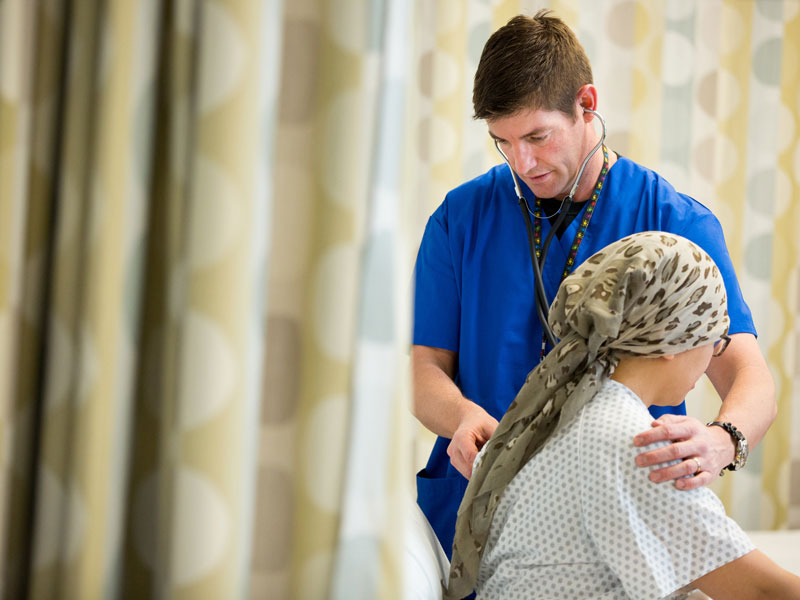Use the Nursing Process to Create a Self-Care Plan

Current events have given us an opportunity, and sometimes even a necessity, to rethink our well-being approaches. But developing a self-care plan doesn’t have to be overwhelming when you use a familiar method like the American Nurses Association’s nursing process.
Breast Cancer Prevention, Screening, Diagnosis, Treatment, Side Effect, and Survivorship Considerations

In the United States, breast cancer is the most commonly diagnosed cancer in women. One in eight women will develop invasive disease in their lifetime with approximately 270,00 new cases diagnosed in the United States in 2019. Caucasian women have the highest incidence rate, whereas African American women are most likely to die from the disease. The five-year survival rate is 91%, with an estimated 3.8 million breast cancer survivors living in the United States.
- Read more about Breast Cancer Prevention, Screening, Diagnosis, Treatment, Side Effect, and Survivorship Considerations
- Add new comment
Addi Georgantzis
Radiation Clinical Trials Must Evolve to Include Patient-Reported Outcomes

Prostate cancer is one of the most common cancers treated with radiotherapy (RT). Conventional RT for low-risk patients usually involves 40–45 treatments given over eight or nine weeks. Several studies suggest that hypofractionated RT—fewer treatments but with a higher dose per treatment—may produce a similar survival benefit. When two treatments have similar survival outcomes, the decision process looks at symptom profiles, quality of life, and cost.
- Read more about Radiation Clinical Trials Must Evolve to Include Patient-Reported Outcomes
- Add new comment
Manage Cancer Treatment-Related Lymphedema With ONS Guidelines™

Surgical treatment for breast, gynecologic, prostate, lymphoma, melanoma, or head and neck cancers puts patients at risk for developing secondary lymphedema at any point in the remainder of their life. Studies show that as many as 10%–40% of patients with breast cancer may experience breast cancer–related lymphedema.
Position Statements and Response Team Support Therapies and Research During Pandemic

Supporting oncology nurses in administering cancer treatments and nurse scientists in conducting research during the COVID-19 coronavirus pandemic were priority topics for the ONS Board of Directors’ August 25, 2020, meeting by conference call. After approving its board goals for 2020–2021, the ONS Board made the following decisions that you should be aware of as an ONS member and practicing oncology nurse.
- Read more about Position Statements and Response Team Support Therapies and Research During Pandemic
- Add new comment
What It Feels Like to Be a Nurse of Color

I was born in India but came to the United States of America when I was 16 years old to be with the rest of my family. Having been an American citizen for 20 years, I have called this country home for most of my life. However, I still feel like an outsider and the workplace is no exception.
100th Anniversary of Women’s Suffrage Reminds Us of the Power of Our Vote

The revolutionary declaration written 244 years ago, proclaiming that “all men are created equal,” maintains that a true democracy must be based on an individual’s right to vote and the freedom to exercise that power at the ballot box. Since 1998, women voters have embodied that concept, achieving a majority vote with higher rates than men. Of registered women voters, 55% went to the polls in 2018, compared to only 51% of registered men. Yet today women account for only 23.2% of the members of the U.S. House of Representatives and 26% of the U.S. Senate.
- Read more about 100th Anniversary of Women’s Suffrage Reminds Us of the Power of Our Vote
- Add new comment
Megha Shah
It’s Time to Take a New Look at Radiation Therapy

Radiation therapy (RT) has been used as a safe and effective treatment option for patients with cancer for more than a century. Like any cancer therapy, it does carry risks and side effects, but RT has improved drastically over the past 20 years and has even been shown to enhance the effectiveness of immunotherapy.





